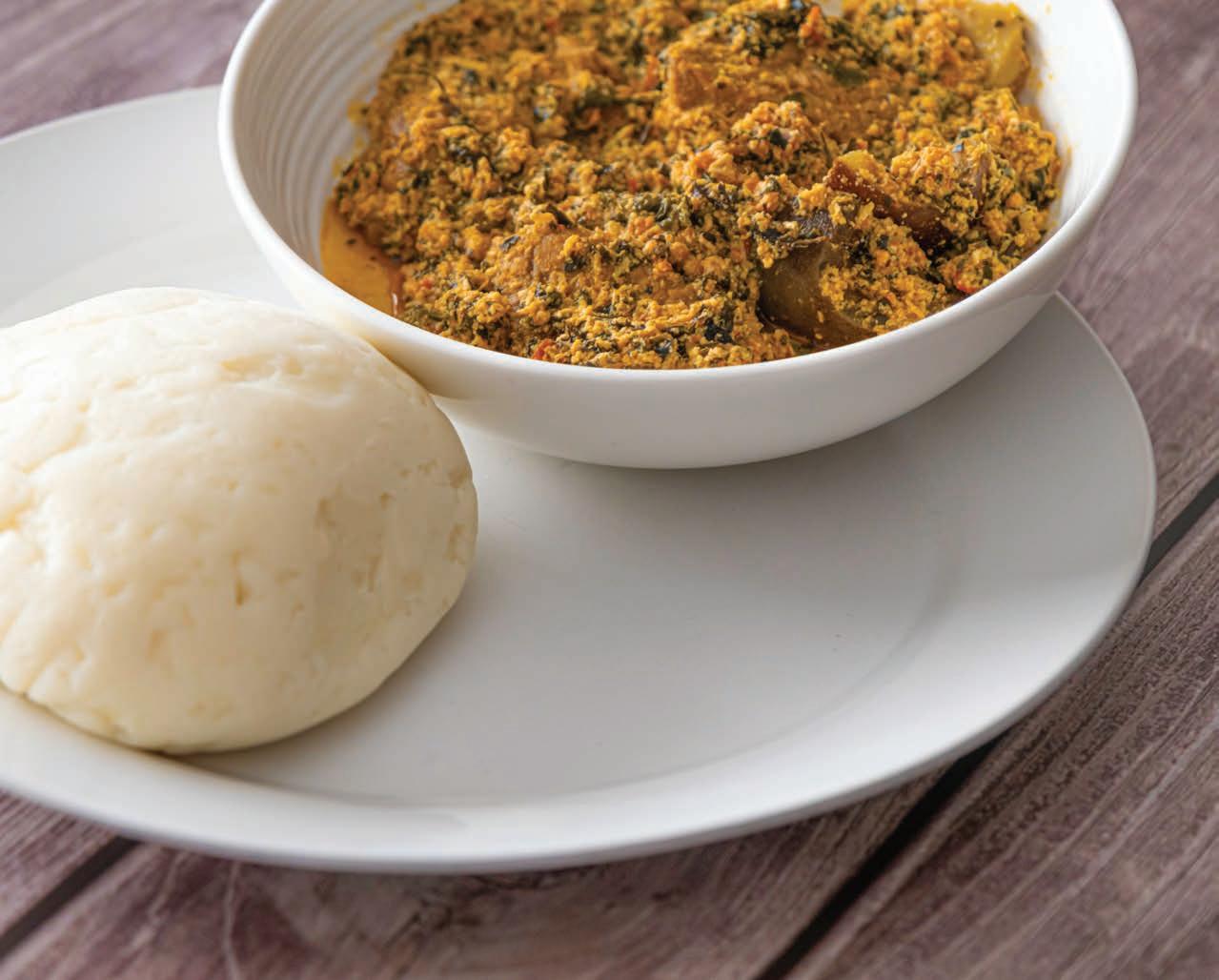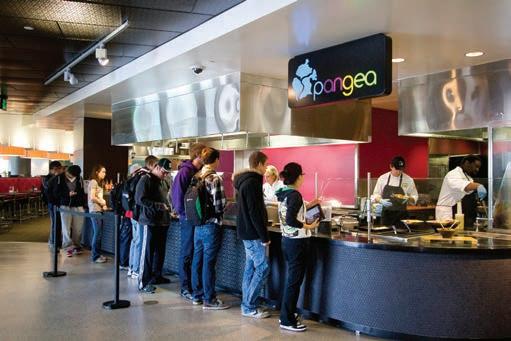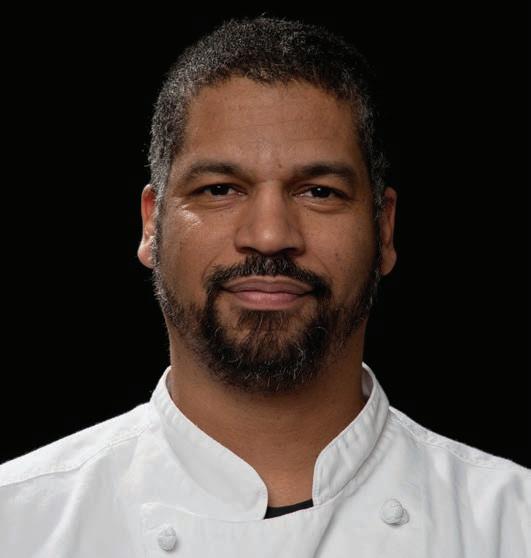
16 minute read
Rising Up
from National Culinary Review (March/April 2022)
by National Culinary Review (an American Culinary Federation publication)


For budding chefs, veteran ACF members share the decisions they made that helped propel their careers // By Jody Shee


you’re reading this, chances are, the culinary arts are your passion. Perhaps you have sacrificed something to be where you are in your pursuit. But what does it take to actually achieve that dream job — sooner rather than later? Consider these five choices suggested by accomplished ACF chefs to put you on the path to quicker success.
Have a plan and stick to it
In order to make a positive careerenhancing choice, you need to have a plan, says ACF Chef Chad Young, culinary arts educator at Greater Lafayette Career Academy in Lafayette, Indiana. “Know your passion and stick to it, trusting your gut feeling,” says Chef Young, who loved cooking from an early age, but pursued careers others thought were best for him. He first majored in voice performance and then elementary education before realizing that cooking was all he wanted to do all day, every day.
“I finally went to culinary school and never looked back,” he says. While he didn’t have the resources to go to culinary school early on, he now believes that those who are passionate about the trade will find a way to make it happen. “Had I known from Day One that I love culinary arts and cooking, I would have found a way versus jumping through hoops for others and being a people pleaser and not a me pleaser.”
Now, Chef Young combines education and culinary, teaching culinary students in a career tech education program. At 48, he is finally realizing a dream of opening a restaurant — without using a dime of his own. The school is opening a studentrun restaurant over which Chef Young has complete oversight, “and now I’m getting to do any- and everything I wanted to do without the burden and stress of financial backing. If you know what you want to do, follow it. Go for it.”

Chef Chad Young, culinary arts educator at Greater Lafayette Career Academy, Lafayette, Indiana, works with student Jeremiah Skiles in the kitchen.

Chef Kevin J. Walker, CMC, AAC, executive chef at Ansley Golf Club, Atlanta
Choose advancement over money
Some of the best career- and goaladvancing jobs may not pay well. Instead, choose based on the experience the job offers, says Chef J. Kevin Walker, CMC, AAC, executive chef at the 5-star Ansley Golf Club in Atlanta. After working for mom-and-pop restaurants in the early 1980s, Chef Walker landed a job at a small country club. But when the door opened for him to work at the esteemed Arizona Biltmore in Phoenix, he left his $12 per hour job to work at the Biltmore for $3.35 per hour. “I went from being financially OK to selling my car, having to walk home from work most nights and having only $20 to $25 to my name after paying rent for about three years just because of the experience,” he says.
One time, while living in New Jersey with his grandparents, Chef Walker walked up and down the street cold-calling restaurants looking for a job. “I got offers from a lot of places, but none seemed right,” he says. “Then, I walked into the back of a French restaurant, and it was clean, and they were all in uniform with hats and neckerchiefs. I realized I had been missing professionalism. They asked if I could work nights. I said ‘yes,’ and I didn’t even ask what the pay was. I just knew that’s where I wanted to be.”
Determine the ideals you’d like to emulate and choose jobs that will take you to those ideals.
Say yes to opportunities outside your comfort zone
Whether they be employment prospects or dish-creation challenges, jump at the chance to pursue new opportunities, setting aside fear of failure, says Chef Emilia Tomaszycki, CEPC. At 24, she became the youngest person to pass the certified executive pastry chef exam, and now, at 25, is the executive pastry chef at the renowned Bonita Bay Club in Bonita Springs, Florida.
“It doesn’t matter what the opportunity is, make yourself available to whatever may come your way,” she says. “Always be open to move, change or jump out of your comfort zone. Don’t ever get comfortable somewhere.”
With that mindset, Chef Tomaszycki doesn’t refuse to take on a cooking challenge for fear of burning something. “You will make mistakes. Don’t be afraid of that. It doesn’t mean you failed. It means you found another way of how not to do something.” That’s the advice Chef Tomaszycki says she would give her younger self.
Train under a mentor
“Find a mentor to lead you through the disciplines of the fundamentals until they become second nature,” says Chef Jason Hall, CMC, vice president of research and culinary development for kitchen equipment manufacturer Southbend (a Middleby company) in Fuquay-Varina, North Carolina. He was fortunate to find such a mentor at age 19 or 20 when he went to work at a country club for a chef he knew little about. Chef Hall says he was grateful to learn scratch cooking from his mentor.
“Learning those skills from a young age set the roots for my path.” It turns out, his chef mentor was Chef Jimmy Corwell, CMC, who had just been selected for ACF Culinary Team USA to compete at IKA/Culinary Olympics. Chef Hall embraced the wealth of information he gained, including classical sauces, classical fabrication techniques and ways to use the trim.

Chef Emilia Tomaszycki, CEPC, executive pastry chef at Bonita Bay Club, Bonita Springs, Florida
Build your network
Start with your mentor. “If you have good mentors, they have fantastic networks,” Chef Hall says. “Then, if you stand out in business or in their kitchen brigade, you will get involved volunteering, catering and traveling with them to help transport food to competitions, for example.” He became immersed in Chef Corwell’s network of master chefs and was invited to their master chef dinners.
This network of master chefs and competition teams was a guiding light for Chef Hall. In 2012, he successfully passed the certified master chef exam. He also was a member of the ACF Culinary Team USA 2016 that represented the United States in international cooking competitions across the globe. In October of that year, the team dominated the cold food/culinary art category as world champions, placing first out of 42 countries and placing fourth overall at IKA Culinary Olympics in Erfurt, Germany.
While in culinary school, Chef Walker volunteered for any dinner that needed help as part of his strategy to meet people and network. He even got to cook an event lunch for renowned French Chef Paul Bocuse and was able to meet the legendary Julia Child.
“Work for reputable people who do things correctly and who are willing to teach you,” Chef Hall says. “Know the difference between something done right and with quality versus something that just gets done. Don’t sacrifice your own moral standard.”

Chef Jason Hall, CMC, vice president of research and culinary development for kitchen equipment manufacturer Southbend, Fuquay-Varina, North Carolina
ACF Student Chef of the Year Marissa Brazell Shares her Mentorship Story
At age 24, Chef Marissa Brazell is racing down the track to her future. A graduate of Oregon Coast Culinary Institute, Coos Bay, Oregon, she’s already earned ACF’s 2021 Student Chef of hte Year Award, been named president of the ACF Young Chefs Club and is in her second season as a pastry cook at Mountain Lake, a private club community in Lake Wales, Florida. Her next goal will be earning the executive pastry chef title. After that, she plans to try out for the 2028 ACF Culinary Team USA to compete on the global stage in Germany at IKA/Culinary Olympics.
With three solid mentors helping her fill the wind for her sails, Chef Brazell has a leg up when it comes to reaching those goals. Her advice for culinary students is to find a few professionals you look up to as mentors and ask them to push you and help you become better. We caught up with Chef Brazell to ask more about her mentors and her views on mentorships.
Q: Who are your three most influential mentors?
A: The first is Chef Fred Wright, CEC, AAC. He was my high school chefinstructor at Academy of Arts, Careers and Technology in Reno, Nevada. He always encouraged me to continue with culinary past high school and to look at making it my career. He would make me sous chef of the baking class and taught me responsibility and confidence. The second is Chef Randy Torres, CEC, AAC, director of Oregon Coast Culinary Institute in Coos Bay, Oregon. He convinced me to try out for the school competition team when he was serving as coach. We won the 2019 ACF National Student Team Competition. He’s always believed in me, especially when I didn’t believe in myself. My third mentor is Executive Chef Patricia Nash, CEPC, at Mountain Lake, where I work. By her example, she has taught me about managing a team and what it means to be a leader in the kitchen. She has helped to train and refine my pastry skills, as well as coached me for the Student Chef of the Year competition that I won in 2021.
Q: How do you define a mentor?
A: To me, a mentor is someone who gives advice, encouragement and support to those in the same position that they once were in. Interestingly, I never sought out mentors. I found my mentors because they were people I looked up to, and they saw I wanted more. They saw my passion and drive, and we built a close relationship because of that. They took me under their wing.
Q: What’s the value of having mentors?
A: You can go to them for advice, help and support. They have already done what you are trying to do. They can give you great advice based on their past experiences. Career-wise, my mentors have given me more connections and opportunities than I would have had otherwise, and they have helped increase my confidence and improve my skills in the kitchen.
Q: What does it take to be a good mentee?
A: You must be willing to work and be open to change. It’s not always comfortable to be pushed, but you have to realize it’s necessary for your growth. You have to be focused on the bigger picture of your goals and realize that your mentors’ support will help you get there.
Q: Other than connecting with your local ACF Chapter, what advice do you give to others to encourage them to find a mentor?
A: Find someone you look up to professionally and ask them to push you and help you to become better. Then be willing to put in the work.

Chef Ann Cooper, CEC
Founder, Chef Ann Foundation // By Amelia Levin

People know her as the “Renegade Lunch Lady” who has helped transform school nutrition programs at tens of thousands of schools across the country, impacting millions of children and the communities surrounding them. But before that, Chef Ann Cooper, CEC, was a fast-rising chef in the white tablecloth world of the 90s.
From 1990 to 1999, Chef Cooper, a Culinary Institute of America graduate of ‘79, served as executive chef of The Putney Inn in Vermont. Little did she know that her career path would change drastically at the end of that tenure, when she was approached by Ross School, a private K-12 facility in East Hampton, New York, to develop a brand new foodservice program.
At first, Chef Cooper, who had been heavily immersed in the more glamorous side of chefdom for 25 years and wanted things to stay that way, quickly turned down the offer. The school’s founder, Courtney Ross, tried again, asking Chef Cooper to come visit, so she obliged. Turns out, Ross was a visionary who foresaw a new foodservice program showcasing organic, local and sustainable food — still a novel idea at the time, especially in the K-12 sector. It was even a goal to build a school garden and incorporate learnings from that into the academics. Chef Cooper, who had cooked for plenty of highend philanthropic chef events and had partnered with Share Our Strength and other major nonprofits, was intrigued.
“So I did it. I left the white tablecloth world and became a lunch lady,” Chef Cooper says jokingly. “But I stayed in school foodservice from then until a year ago when I retired.”
As executive chef and director of wellness and nutrition for the Ross School, Chef Cooper fought to break the school foodservice mold that was (and dare say it, still is) heavily embedded in the throes of politics, corporate handouts and restrictive guidelines. She fought not only to feed children food that was grown sustainably without pesticides and preservatives but also to teach children about the importance of that food for their bodies and the planet — part of a movement toward sustainability before the term “farm-totable” was even a thing.
“Ross School had a high profile at the time,” Chef Cooper says, “so we got
a lot of press covering what we were doing. Alice Waters came out to see us, telling us this is what she wanted. She got me to go to California and head the foodservice program for the Berkeley Unified School District.”
It was there, in the mid-2000s, that Chef Cooper came up with the idea for The Lunch Box, a toolkit (now a web portal with free and accessible tools, recipes and resources) for foodservice directors and K-12 school leaders looking to develop from-scratch, healthy and sustainable school nutrition programs. Chef Cooper also became an integral part of Waters’ The Edible Schoolyard Project while serving as foodservice director for Berkeley Unified School District.
In 2009, Chef Cooper left to become the foodservice director for the Boulder Valley School District in Colorado. Looking to further her work on The Lunch Box, she subsequently founded the Chef Ann Foundation, a 501(c)(3) nonprofit with a mission of “helping schools take action so that every child has daily access to fresh, healthy food.”
And that’s where she became known as the “Renegade Lunch Lady,” a woman whose work has helped a whopping 4 million children in 12,000 schools across the country. Today, Chef Cooper remains a partner of Lunch Lessons, LLC, a consultancy for school districts going through large-scale food change. Prior to the pandemic, she was a regular speaker at industry conferences. She has written four books uncovering problems with America’s food supply chain and offering solutions for school food reform and a more sustainable future.
Chef Cooper also started the School Food Institute, an online education center for school foodservice program developers. “We’ve had thousands of people take the classes and have run apprenticeship and fellowship

Chef Ann Cooper, CEC, known as the “Renegade Lunch Lady” and founder of the Chef Ann Foundation, is a long-time champion of nutritious, sustainable meals for school children.
programs in partnership with California Community Colleges,” she says. “You can spend a lot of time thinking about the food, but if you don’t have the staff to cook the food, it doesn’t do any good.”
Just as she was and is a pioneer in school foodservice reform, Chef Cooper was also a pioneer in the ACF
community as one of the first few women members and certified executive chefs.
“When I first joined ACF as a young chef, I was really involved,” says Chef Cooper, who has come back as a presenter for events. “I went to a lot of the conferences, competed in many competitions and even won some gold medals.” But she was often the only woman competing — until she encouraged others to join her.
“I was once working on a cruise ship and had a chef literally tell me, ‘a woman’s place is in the bedroom, not the kitchen,’” says Chef Cooper, who even wrote a book by a similar name: “A Woman’s Place Is in the Kitchen: The Evolution of Women Professional Chefs,” published in 1997. She also spent years serving as president and board member for Women Chefs and Restaurateurs.
Knowing women bring many strong traits to a commercial kitchen — vision,

- CHEF ANN COOPER, CEC
empathy, compassion, humility — Chef Cooper has been just as much a champion for women chefs as for school children. “Everyone’s idea needs to be counted; it’s important to work toward inclusivity,” Chef Cooper says. “As a country, we need to do more to prioritize this, as well as education and healthy food. But I see many changes on the horizon.”







